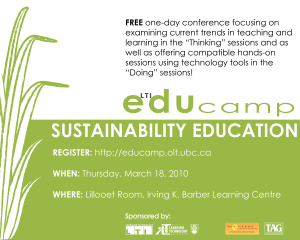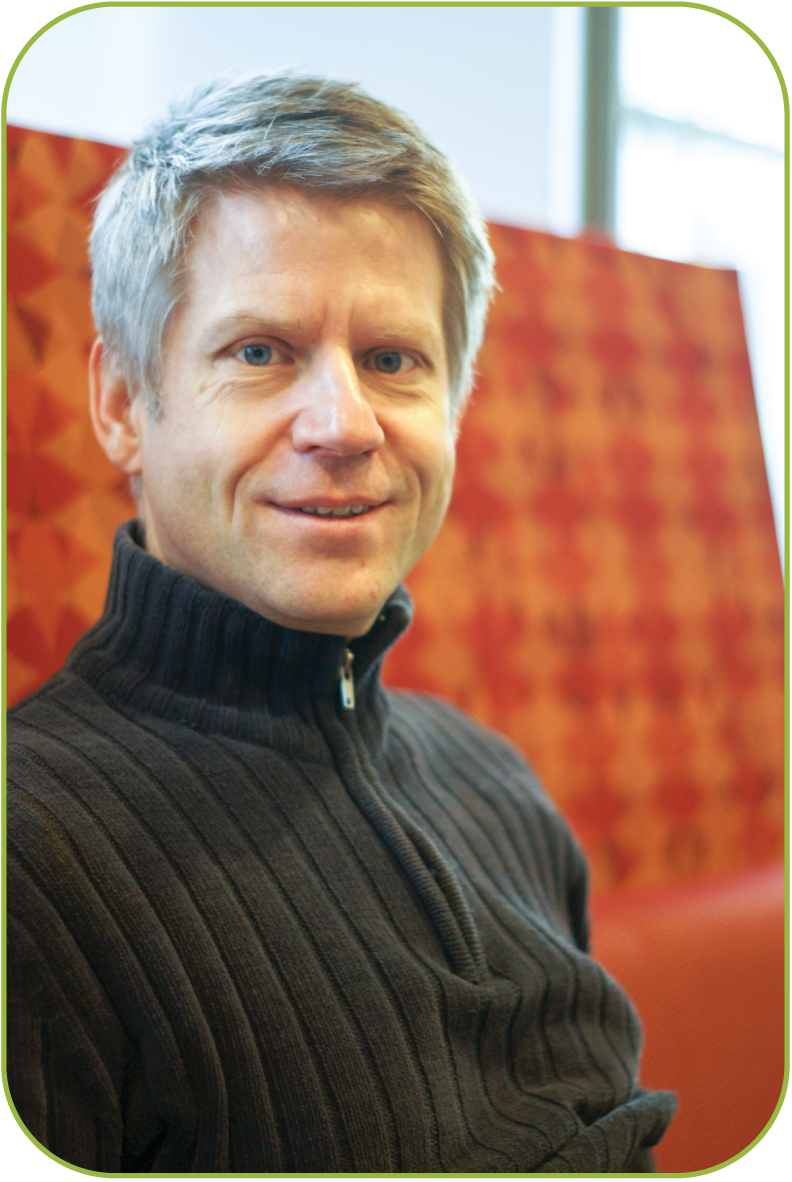 What do you do when the Vancouver 2010 Olympics is over? Come to EDUCamp 2010 of course! The Centre for Teaching, Learning and Technology (CTLT) is organizing this FREE one-day conference on Thursday, March 18, 2010 in the Lillooet Room of the Irving K. Barber Learning Centre (IKBLC). With a theme of Sustainability Education, you will examine current trends in teaching and learning in the “Thinking” sessions and participate in compatible hands-on sessions using technology tools in the “Doing” sessions.
What do you do when the Vancouver 2010 Olympics is over? Come to EDUCamp 2010 of course! The Centre for Teaching, Learning and Technology (CTLT) is organizing this FREE one-day conference on Thursday, March 18, 2010 in the Lillooet Room of the Irving K. Barber Learning Centre (IKBLC). With a theme of Sustainability Education, you will examine current trends in teaching and learning in the “Thinking” sessions and participate in compatible hands-on sessions using technology tools in the “Doing” sessions.
This year’s can’t miss keynote is delivered by Duane Elverum, a sustainability educator in applied critical thinking at Emily Carr University of Art and Design. His work explores reflective and project-based learning, and asks how we might prepare students for a life that will be somewhat different than the one we are living now. To get a taste of his ideas, watch this video from his Pecha Kucha presentation last March 26, 2009 entitled “Playing vs. Living in the 21st Century: a case study”.
Duane’s keynote will be followed by, the Great Debate! Facilitated by the UBC Debate Society, this hour-long battle will have passionate panelists that include students and faculty members arguing on the motion: Social media tools sustain student involvement in formal higher education. As an interesting twist on the traditional debate, we are planning on utilizing iClickers to get instant feedback from the audience members during the progression of the debate.
From a hands-on on podcasting session, to a talk on open education, EDUCamp 2010 is shaping up to be the can’t miss event in March!
Registration is now open and seats are going fast! For more information and to register, please visit http://educamp.olt.ubc.ca.
We also had a brief conversation with the keynote speaker, Duane Elverum, which you can read below.
We do not need magic to change the world, we carry all the power we need inside ourselves already: we have the power to imagine better.
– J. K. Rowling, Harvard University commencement speech, June 2008
I was listening to J.K. Rowling’s speech at Harvard’s June 2008 graduation while working on something completely different. When she spoke the line above near the end, it reminded me of something I heard from my conversation with Duane Elverum, this year’s keynote at EDUCamp 2010. I then felt a sense of urgency to share what we discussed and talked about. His views on education and how the university system works were thought-provoking and insightful yet full of common-sense. He passionately argues for the need to have an education with consequences.
As we sat down in the middle of the Irving K. Barber Learning Centre, right off the bat Duane says, “universities are very good at making successful people but not civically minded people.” By civically minded, he means people who are engaged with society or with each other. Our current educational system is a one-way transfer of knowledge where we only learn what has been done before. It immediately made me pause as I looked around the Irving K. Barber Learning Centre surrounded by students trying to study for a class. Any of them can be future leaders and decision-makers but will they be ready to respond to issues that will affect all of us? We pursue our majors and specializations without learning what their implications are or how they can affect our world. Duane believes in the “accountability of education” where “every personal concern is a topic for public policy”. He continues on to say, “why you buy coffee in the morning or why you drive to go to school has implications on public policy that need to be discussed.”

Duane Elverum, Keynote for EDUCamp 2010: Sustainability Education
These ideas are what drives Duane to co-teach or in his words “co-facilitates” a cohort at the Undergraduate Semester in Dialogue (USD) at Simon Fraser University. Each semester a group of students participate in this 15-credit (10 in the summer) curriculum where there is no set content for the class to cover, only a broad topic left for students to define themselves. It is a model that is very unfamiliar to many of us who are used to having an X amount of topics covered within 3 months, a final paper due a few days before classes end, and a final exam a week or so later. We spend years listening to lectures and discussions, yet many people zone-out or lose interest during class. Duane asks, “if we’re spending that much time in university, shouldn’t classes be more engaging?” His hypothesis is: we learn when we’re doing something we love. In his USD class, assignments focus on reflection, collaboration, and feedback to support each student’s final project. It must be a public or community project on a topic they are passionate about.
Last fall the course was on Art in Community: Creating Cultures of Ingenuity and Innovation and a group of students started Growing Up with Woodward’s (PDF), an art program targeting children within and around the new Woodward’s development in the Downtown Eastside. One of the poorest neighbourhoods in Canada, many residents are concerned with the need to balance issues of livability, affordable housing, and economic development. The program’s mission is to
“foster community engagement through children’s collaborative art projects while building relationships between residents of Woodward’s and the local community, Simon Fraser University, and local art organizations… core values include recognition of the central importance of the artistic process in community art projects: the need for inclusion and accessibility to the program for all children in the neighbourhood; the importance of social investment in the program; the need for its sustainability for both children adults in and around the Woodward’s community; and the importance of the presence of art and art‐making in the building.”
From their mission statement, the students’ defined the course topic for themselves and tackled issues such as community building, childhood education, and public financing that go along with it. Each issue can be a focus of a single course yet these students were learning them as pieces of a larger public issue. Projects like these are completely student generated and organized. Duane says that at the end of the course many students come back to him and say that they just had “the best educational experience of their lives”. Students feel empowered from the work they connected with, something they invested themselves in by choice. He says the program’s success depended on “immersing students in an environment where we work together on how we can save the world.”
I asked Duane, how hard it was for him to shift his teaching style where there is no set content, where projects can vary wildly. His reply to me was a simple, “It wasn’t.” He goes on to explain,
“I also taught studio classes on design and architecture, first here at UBC and then at Emily Carr University. Studio-based instruction is different. Students are given a problem or idea such as sustainability and it is up to them solve it anyway they want. You learn from the creative process. For USD students, dialogue is the method or process that creates its own content. Students then start learning from each other.”
Duane tells me that he wasn’t teaching but facilitating the process for students. He said for many instructors, the shift from teaching to facilitating is quite daunting. It’s something outside their comfort zone since the skills needed are quite different. An instructor acts as a resource and actively empowers students to become resources as well, experts in their own field.
At the end of our conversation, I asked him two questions. One, what is sustainability education? Duane says it is education with consequences. His article with Janet Moore published in the Vancouver Sun says it best,
“As educators, we aim to connect our work with the urgencies of our time. There is a gap between what we are currently doing and what we need to be doing, a gap that could become the foundation of our education. Our universities need to teach students how to examine this gap in every course they take, and then teach them to close it in their professions when they graduate.”
Coming from CTLT, I needed to ask him if technology plays a role in making education sustainable. He responded by defining technology as “anything that we employ to fulfill our desires.” Using his experience with his students at the USD program as an example, Duane says that dialogue is technology. They use it as a tool for learning, finding out how they can save the world in their own way with feedback from others. If our goal is to become more sustainable, whatever tool we use is technology.
When I first saw the video of Duane Elverum’s talk at the Pecha Kucha night last year, I felt I wanted to hear more from him, find out what he had to say. During our conversation though, it felt like Duane actually wanted to hear from me. As a fairly recent university graduate, his ideas on of giving students the choice to do something other than a research paper is a very alien concept as well as having coursework go beyond the classroom. The thought that my work can matter was already getting me excited with the possibilities on what I can do. I felt empowered.
In many ways, Duane is arguing for something very disruptive. He asks all of us, not just those in education, to shift to something that we are not completely familiar with. Yet his arguments do make a lot of sense. Universities continue to educate future leaders and decision-makers who have been taught the same way as the ones before. The need to let students know that their individual actions have public consequences becomes more urgent at a time when issues of climate change and financial crisis require a more systemic and concerted effort from all of us. Reflecting on what J. K. Rowling said at Harvard, we don’t need magic to become sustainable. Professionals, instructors, and students alike do have the power to change the world for the better. Maybe we just need to change the way we learn.

